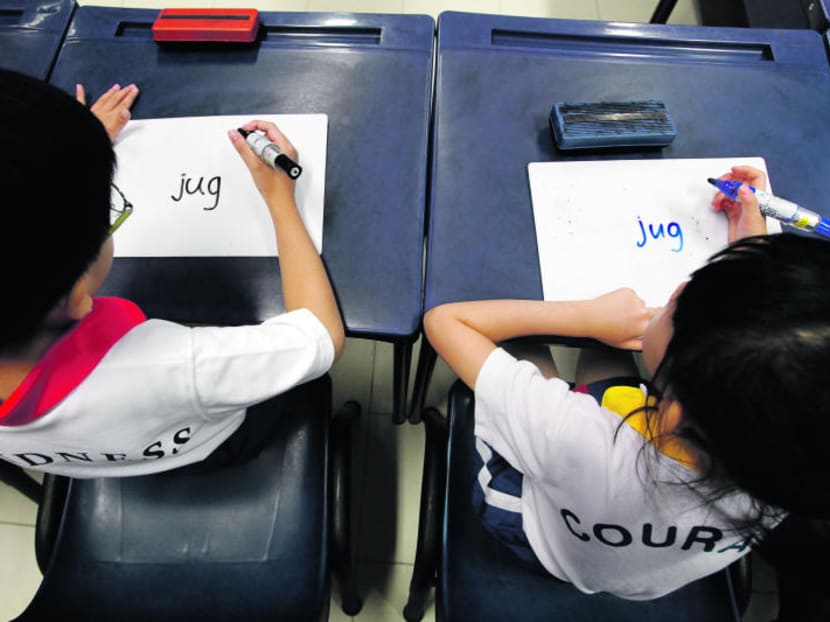Helping your child cope with exam anxiety
SINGAPORE — With exam season just around the corner, it’s no surprise that a majority of students here — and parents too — are feeling anxious right now.

The study showed that 86 per cent of students in Singapore were worried about poor grades, compared to 66 per cent across all OECD countries. TODAY File Photo
SINGAPORE — With exam season just around the corner, it’s no surprise that a majority of students here — and parents too — are feeling anxious right now.
Earlier this year, an international study concluded that Singapore students suffer from high levels of anxiety.
Conducted by the Organisation for Economic Cooperation and Development (OECD), which also runs the Programme for International Student Assessment (Pisa), it aimed to look at the connection between students’ well-being and achievement in these Pisa tests.
More than 5,000 students were polled in Singapore, as part of a total of 540,000 students from 72 countries and economies who took part in this study.
The results showed that 86 per cent of students in Singapore were worried about poor grades, compared to 66 per cent across all OECD countries.
The number of students students feeling very anxious for a test, even if they were well prepared, was also higher: 76 per cent in Singapore, while the OECD average was 55 per cent.
So what can parents do to help soothe their children and not let them go down the dark path of anxiety? The first step is to look out for the signs of anxiety, say experts.
“Anxiety often is accompanied by signs of restlessness or fatigue during waking hours, problems in concentration or sleepiness during the day, accompanied by muscular tension or trouble in sleeping at night,” said Irena Constantin (M.Phil), an educational psychologist at Scott Psychological Centre.
“It’s important to pay attention to your child’s feelings and signs of anxiety and to stay calm when your child becomes anxious about a situation like exams.”
CHANGES IN BEHAVIOUR
Dr Sara Delia Menon, a clinical psychologist at Alliance Counselling, suggested that parents determine if the anxiety is proportionate to the stressor and compare their child’s response to past behaviour.
So, for instance, greater anxiety can be expected for national or other milestone examinations, compared to class tests.
It’s also important to look out for changes that are out of character. She cited examples such as mood changes, changes in social interaction or differences in activity level.
If these changes are temporary — lasting no more than a few hours — and related to a specific trigger, such as being scolded by a teacher or parent, and infrequent, the stress response is likely to be normal.
“However, it warrants further exploration if the changes in your child’s behaviour are more long-lasting, are not associated with specific triggers and occur on a regular basis,” said Dr Menon.
If your children are indeed going through an anxious phase, you should let them know that you are there for them. Constantin said one can provide support by accepting your child’s feelings and empathising with his or her situation.
“Anxiety is a very scary feeling and your child needs the reassurance that you’re together with him,” she said.
“Make sure you’re taking the child’s feelings seriously and providing a good balance between learning and playing, together with healthy food and enough sleep.”
Constantin also pointed out the importance of recognising small accomplishments and not punishing mistakes. In fact, allowing your child to make mistakes can actually be used as a motivator.
“We do learn from our mistakes,” she explained. “Mistakes force us to rethink and reflect what went wrong so we avoid doing the same ‘learning mistakes’ next time. Reflecting is a good tool and will help your child decrease his anxiety levels and to gain control over the exam situation.
“Keep going on as a parent to believe in your child and encourage him to go ahead even if he failed,” she added.
THOUGHTFUL ACTS
Dr Menon recommended reassuring children that exam stress is normal in the short term and to draw on past instances where your child successfully managed a stressful situation, to provide hope and motivation.
Parents should also certainly spread the love, in order to “affirm your child’s self-worth”, she said.
For example, you can engage in acts of thoughtfulness such as making your child’s favourite meal, provide verbal praise or positive feedback that includes but isn’t limited to academic achievement, and give your child generous amounts of affection, through hugs, kisses and loving words.
While you’re at it, make sure that your child is getting the right amount of sleep and level of concentration during this exam period.
“Reinforce the importance of rest and maintain pockets of time for leisure or relaxation even during the examination period,” urged Dr Menon.
“Try to plan a study schedule with your child in advance and emphasise consistent hard work, rather than last-minute panic. Also always send the message to your child that their well-being is ultimately most important.”
Since exam season is also a stressful time for parents, experts said it’s essential that they too, look after themselves.
Dr Menon proposed separating your own feelings from your child’s feelings, and to be aware of and manage your personal stress and tiredness.
“Many parents overreact to their children after a long day at work because they have other demands on their time and energy,” she said.
“Try and build in self-soothing activities like deep breathing, or physical activity like walking to prevent an escalation of conflict with your child.”
Not only will this help ease any tense situation in the home, it can perhaps also help your child cope better with exam stress, knowing that parents aren’t seemingly unnecessaril haranguing them.
“Learning is challenging enough; scolding, threatening or bargaining with your child is not going to get him or her to learn any faster,” Menon said.






